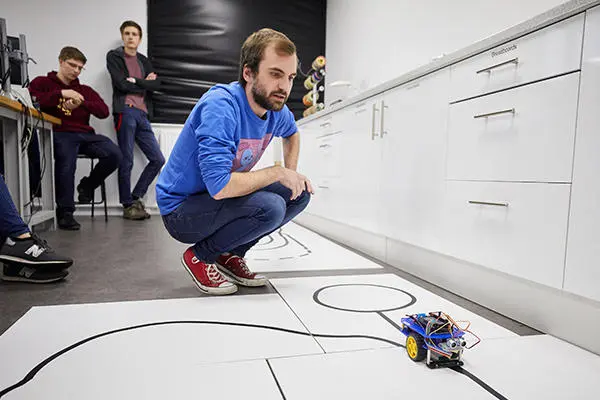
“Solent has it right, however, with industry-focused courses and lecturers.”


Currently employed in the engineering industry? If you want to further your career in electronic engineering, this practical and flexible course will prepare you for a range of roles.
Contact international admissions
Email: Call:Gain a broad understanding of the principles and practices of electronic engineering on this Higher National Certificate course and become equipped with the basic technical knowledge and skills for employment in electronic engineering and related fields.
Led by a highly experienced academic team, you will learn a range of electronic systems such as introduction to the electrical and electronic principles, electronic devices, circuits, analogue and digital electronics, microprocessor systems and manufacturing principles; and will foster an appreciation of environmental sustainability, ethical conduct, safety, and professional standards in electronic engineering.
This course has been specifically developed for those already in employment, and will enable you to learn in a rich, stimulating and intellectually challenging environment – helping you to progress in your electronic engineering career.
Throughout the course you will have the opportunity to gain real-world experience to enhance your employability skills and potential – ensuring that when you graduate you will be capable of making an immediate contribution in the workplace at an appropriate level and adopt a lifelong learning approach as part of your continued professional development.
Solent's HNC Electronic Engineering programme is suitable for students who have a passion for electronics and want to develop their skills in designing, creating, and maintaining electronic systems.
It is part of a suite of engineering HNC qualifications designed to provide part-time students with the opportunity to gain entry level qualification in an engineering discipline. The course suits students who are employed in an engineering field and looking to progress their career or those wish to embark on a career change in a range of technical and professional roles in electronic engineering.
The course is designed to meet the needs of local and regional employers by delivering a provision geared to their requirements. Upon successful completion of the course, students have the option to continue studying towards full BEng or MEng qualification. It is a first step on the journey towards becoming Incorporated Engineer.
The nature of this course means that the majority of students are already in employment. Completion of the course holds the potential for future career advancement.
Hear from Solent alumni about where their careers have taken them and how studying at Solent prepared them for their future.

“Solent has it right, however, with industry-focused courses and lecturers.”

The University cannot guarantee any particular members of staff will teach specific aspects of the course in the future, but will endeavour to ensure the teaching team maintains their balance of experience and qualifications.
Electronic engineering students benefit from access to a range of high-end facilities including rapid prototyping equipment, PSpice/NI MultiSim software and microcomputer development systems. Solent University also offers students access to digital multi-meter signal generators, FLIR cameras and digital signal processing (DSP) boards – all of which allow students to better understand how the theory they have learnt links to real workplace scenarios.
Laboratories also include NI MultiSim eCAD software, rapid prototyping equipment with 3D printers and laser cutters, and a wide range of development systems for microcomputer and microcontroller systems.
This module sits within the circuit theme and is designed to give you an introduction to the basic terminology, concepts and devices used in electronic circuits.
On this module you will learn how to apply a range of mathematical techniques to realistic engineering problems. You will use basic algebra and solve simultaneous equations and equations of straight lines to answer engineering problems around linked variables in mechanics and electronics.
This module is designed to introduce you to the electrical and electronic principles necessary to analyse circuit behaviour and design. It also provides the foundation for further study of more specialised electrical/electronic engineering techniques used later in your course.
This module helps you to develop an awareness of the factors affecting the selection of materials and processes used in manufacturing a product. It does this by comparing the attributes of materials and the suitability of processes in the light of the external factors that need to be considered when developing the product design specification.
Almost all modern engineering systems contain microcomputer systems, which are especially important in the development of industry 4.0. This module is designed to introduce you to this area and develop your knowledge of the theory and practice of structured programming through high-level language.
This module will introduce you to the profession of engineering. This includes both theoretical and professional skills relating to the role of the professional engineer and also supports your transition into higher education.
Contact international admissions
Email: Call:Solent’s curriculum framework builds on our unique, creative and applied approach to teaching. The transformation of students’ lives is at the heart of our mission as a university, and our curriculum – informed by the latest theory – reflects this shared educational vision.
Find out more
The student achievement team are on hand to help you succeed during your studies at Solent. They aim to contact you at key times during your time here with personalised information, advice and guidance, by email or phone.
The disability advice team provides information, advice and guidance for disabled students.
All students can access Succeed@Solent, Solent's online guide to getting better grades. It offers extensive, practical information and advice on topics such as academic writing, research and presentations.
According to the Engineering Council, 18 per cent of the UK's workforce works in engineering. However, the sector is experiencing a skills shortage with a number of engineering occupations featuring in the Government's shortage occupations list. Electronic engineering is one of these occupations, meaning there should be many opportunities for industry-ready graduates to make their mark.
This course aims to provide students with the knowledge that electronic engineering employers will require. These range from essential mathematical concepts to circuitry, automation, data communications and signal processing skills. Critically, past students have been able to gain an insight into real-life engineering problems, tackling projects defined for them by our network of industry contacts.
Students are encouraged to interact with the industry throughout the curriculum. In previous years, Solent’s engineering students have had the opportunity to work closely with employers such as Rolls-Royce, SAAB, Sea Eye, TUV and Coopervision. The Institution of Engineering and Technology and the Wessex Round Table of Inventors (WRTI) have also held regular local professional development events on campus.

Graduate £25,000 to £33,000
Graduate training schemes may pay towards the top end of the starting scale. With experience, possibly working at an incorporated engineer level, you could earn around £30,000 to £45,000. As a senior engineer you can expect a salary in the range of £45,000 to over £65,000, with chartered engineers earning a salary at the top end of this scale.
Graduate £20,000 to £25,000
Mid-range salaries usually fall between £30,000 and £38,000. With experience, your salary could rise to £45,000.
The stated salaries are published on prospects.ac.uk. Income figures are intended as a guide only.
Hear from Solent alumni about where their careers have taken them and how studying at Solent prepared them for their future.

“Solent has it right, however, with industry-focused courses and lecturers.”

The Solent Careers team is committed to getting students into great careers.
While you are studying, the team can help you with finding work experience or placements, link you with a mentor, check your CV, or offer one-to-one guidance.
We also have graduate job opportunities just for Solent graduates.

6th
UK uni for sustained employment
Longitudinal Educational Outcomes, 2022
Every student at Solent University will also have the option to study an additional Certificate in Practical Artificial Intelligence qualification alongside their course. Free of charge, the course ensures you'll be prepared for a fantastic and varied career after graduation.

Thinking about studying further than an HNC qualification? Take a look at the undergraduate courses you could progress on to.


The tuition fees for the 2026/27 academic year are:
For further information, please visit our tuition fees page.
While most course costs are covered by your tuition fees, some essential resources and optional extras may need to be paid for separately. These additional costs are listed below. For advice on budgeting and managing your money, please contact student.funding@solent.ac.uk.
The 2026/27 additional costs are not yet available. For guidance, previous additional costs have been:
Solent University offers a range of bursaries and scholarships that provide financial assistance or waive fees for tuition or accommodation. Each bursary or scholarship has specific eligibility criteria. Check out our bursaries and scholarships pages to find out more.
Cost of living support
At Solent, we understand that the cost of living crisis may be of some concern. To help, we've put together some detailed information to show what support is available and how to make your money go further.
Graduation costs
There is no charge to attend graduation, but you will be required to pay for the rental of your academic gown (approximately £45 per graduate, depending on your award). You may also wish to purchase official photography packages, which range in price from £15 to £200+. Graduation is not compulsory, so if you prefer to have your award sent to you, there is no cost. Extra guest tickets will go on sale after results publication and will be sold on a first-come-first-served basis. The cost per ticket is currently £20. Please note, we do not guarantee there will be any extra tickets available to purchase.
Contact international admissions
Email: Call:Please select an option below:
For further information about UK, EU and international qualifications, please see our course entry requirements document.
Students from outside the UK are usually unable to obtain a visa for part-time study. Please visit our visas and immigration page for more information.
Full-time
Any student applying for the first year of a full-time/sandwich undergraduate course must apply through UCAS (University and Colleges Admissions Service). This includes mature, overseas and EU students.
Nearly all schools and colleges offer their students the facility of applying electronically through the UCAS website using 'Apply'; it may also be used by those applying independently in the UK and overseas. This facility and all course information can be found on the UCAS website: www.ucas.com.
Your application should reach UCAS by 14 January if you hope to enter a course the following autumn. Early application is advised for the most popular subject areas. Late applications may be made until the end of June. The UCAS Code for the University is S30, code name SOLNT.
Find out what happens after you apply
Contextual offers
Solent endeavours to offer learning opportunities to students from all backgrounds. When we receive and review an application, we take into consideration the context and personal circumstances of applicants when making a decision, which means our advertised entry tariff could be reduced.
Find out more about Solent's contextual offers
Applications are welcomed from students who do not have the academic qualifications listed above but may be admitted on the basis of relevant experience rather than standard qualifications.
Important note about progression routes:
Progression to a Pearson Higher National Diploma (HND) qualification is not automatically available after completion of this Higher National Certificate (HNC) course.
Solent’s HNC is awarded under a Trademark Licence and the final award from this course, although mapped closely to Pearson’s programmes, is not a Pearson BTEC Higher National award.
Candidates wishing to progress onto a course at another provider may need to complete additional modules or check with the provider if acceptance to the progression course will be available with the HNC award. Many providers offer recognition of prior learning, but this will be on a case by case basis.
Students graduating from Solent do have progression routes at Solent University to degrees or to other professional qualifications.
Applicants who do not have English as their first language will be required to demonstrate an approved level of proficiency in the use of the English language. The agreed minimum requirements for this course are:
TOEFL IBT tests taken prior to 21 January 2026
TOEFL IBT tests taken from 21 January 2026
Qualifications are checked before enrolment, and international students must bring their original certificates or certified copies when coming to study at the University.
Pre-Sessional English programme
The University also offers a pre-sessional English programme for international students who wish to improve their level of English before starting a degree course.
Contact international admissions
Email: Call: